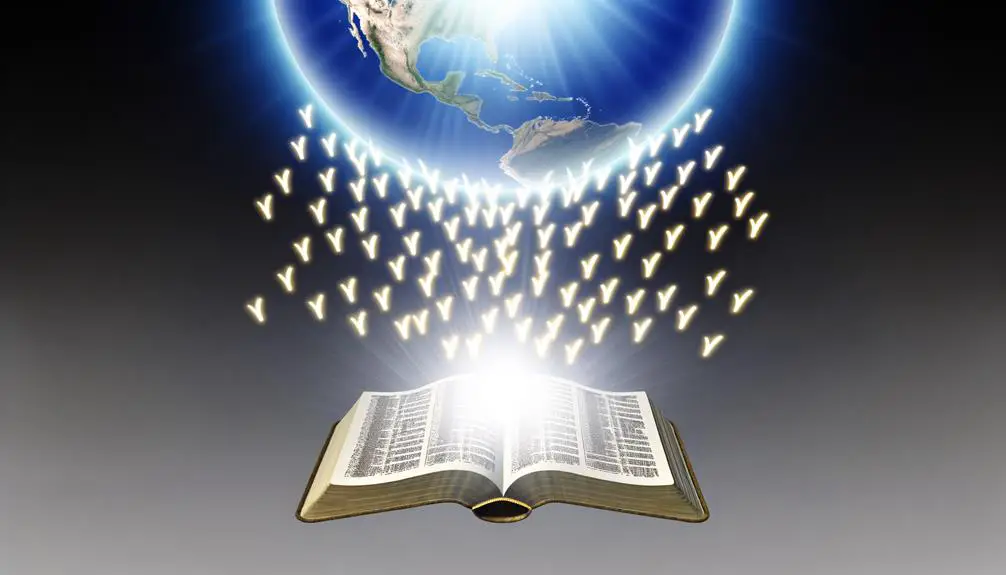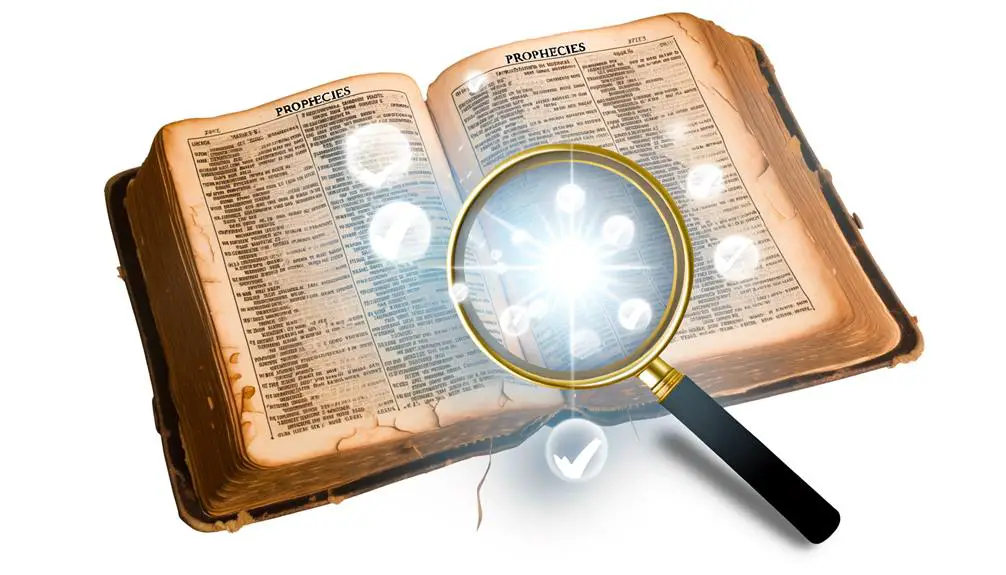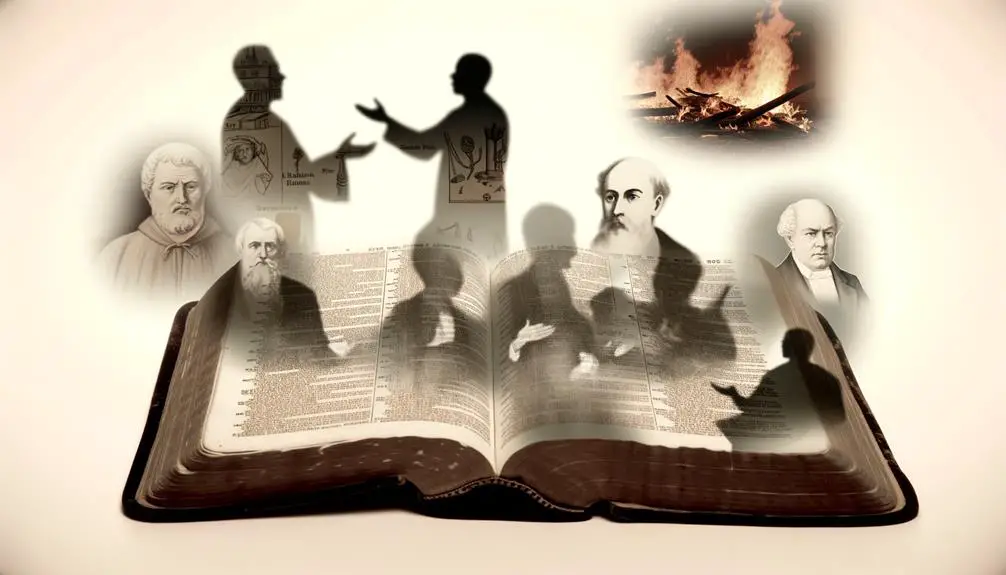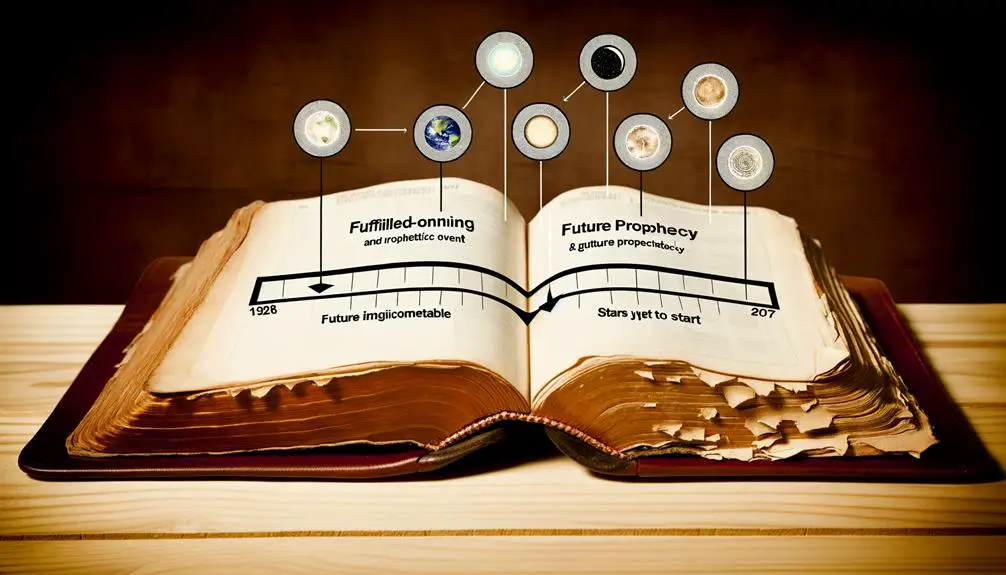Trace the intricate web of fulfilled prophecies in the Bible and uncover their profound impact on history and the future.

How Many Prophecies Have Been Fulfilled in the Bible
Like a puzzle with pieces scattered across centuries, the Bible contains numerous prophecies which, according to believers, have been fulfilled.
Your task, a scientific one, involves analyzing these prophecies in an objective manner, examining their initial presentation, subsequent fulfillment, and the validity of claims made by various faith communities.
But remember, this isn't just a dry academic exercise. The outcome could potentially reshape your understanding of the Bible, history, and perhaps even the future.
Would you find the tally to be in hundreds, or less? That's for you to ascertain.
Understanding Biblical Prophecies

Diving into the realm of biblical prophecies, it's imperative that you grasp their inherent complexity and multi-faceted nature. Prophecy interpretation isn't a simple task—it's a meticulous process of understanding the nuances of divine communication to mankind.
Historically, it's observed that prophecies are often encoded in symbolic language. You've got to decode the biblical language, which is often metaphorical, allegorical or apocalyptic, to extract the true meaning. This is where the analytical aspect kicks in. You're not simply reading a text; you're interpreting a divine message, an intricate blend of history, spirituality, and prophecy.
The scientific precision required in prophecy interpretation can't be understated. It's not just about finding a possible fit; it's about identifying the exact fulfilment. For instance, a prophecy could be interpreted in multiple ways, but only one interpretation will align perfectly with historical events. This is the puzzle of prophecy interpretation—each prophecy is a piece of the larger picture of divine communication.
It's also essential to acknowledge the role of cultural and historical context in prophecy interpretation. Understanding the socio-cultural milieu of the time when the prophecy was made can shed significant light on its intended meaning.
Key Figures in Prophecy Fulfillment

When you delve into the fulfillment of biblical prophecies, you'll encounter key figures that played pivotal roles in the actualization of these divine predictions. Their actions, often driven by divine intervention, not only shaped history but also served as a testament to prophetic accuracy.
The first key figure is Moses. Known for his leadership during the Israelites' exodus from Egypt, Moses fulfilled the prophecy of a deliverer in Exodus 3:10, where God commands him to lead His people out of Egypt.
Another key figure is King Cyrus of Persia. His decree to rebuild Jerusalem, as documented in Ezra 1:1-2, fulfilled the prophecy in Isaiah 44:28, demonstrating the precision of divine predictions.
Jesus Christ, arguably the most significant figure in prophecy fulfillment, is the embodiment of numerous prophecies, including His birth, ministry, death, and resurrection, which underscore the prophetic accuracy of the Bible.
Here's a brief overview of these key figures:
Key Figure |
Prophecy |
Fulfillment |
|---|---|---|
Moses |
Exodus 3:10 |
Led Israelites out of Egypt |
Cyrus |
Isaiah 44:28 |
Rebuilt Jerusalem |
Jesus |
Multiple Prophecies |
Birth, Ministry, Death, and Resurrection |
It's important to understand that these figures didn't merely fulfill prophecies by accident. Their actions, influenced by divine intervention, were integral to the unfolding of God's divine plan, further proving the prophetic accuracy that underpins the Bible's narratives.
Fulfilled Prophecies: An Analysis

In examining the fulfilled prophecies, it's crucial to dissect each one carefully, considering the context, historical accuracy, and its relevance to today's world. Your approach should involve a meticulous prophecy interpretation to extract the true essence of the message.
Let's not ignore the prophetic symbolism used in these predictions. Symbols, like the lion or the lamb, often represent nations or individuals in prophecies, adding depth and complexity. Recognizing these symbols and interpreting them correctly is key to understanding the prophecies.
For instance, consider the prophecy of Tyre's destruction in Ezekiel 26. Historical records indicate that Alexander the Great fulfilled this prophecy, but only by interpreting the 'many nations' as his diverse army can we fully appreciate its fulfillment.
It's also essential to scrutinize the timing and precision of these prophecies. Were they vague or specific? Did they predict events far into the future or just around the corner? The more precise and remote the prophecy, the more compelling its fulfillment.
Consider Isaiah 53's prophecy of a suffering servant. Written centuries before Christ, its detailed depiction of his life, death, and resurrection is remarkable. However, its interpretation has been contentious, highlighting the importance of context in prophecy interpretation.
Impact on Faith Communities

You're now examining the impact of fulfilled Biblical prophecies on faith communities.
Consider the profound influence these events have on believers' spiritual perspectives and behaviors.
Take into account also how these prophetic fulfillments serve as faith-strengthening occurrences, fortifying belief systems, and fostering unity within religious groups.
Prophecies' Influence on Believers
Biblical prophecies have a profound impact on believers, often shaping their worldview, guiding their actions, and strengthening their faith. Prophecy interpretation becomes a crucial tool in understanding the prophetic significance of these divine messages.
- Influence on Worldview: Prophecies provide a roadmap of God's plan, shaping believers' perspectives on life, morality, and purpose.
- Guidance for Actions: Through prophecies, believers discern God's will and align their actions accordingly.
- Faith Strengthening: The fulfillment of prophecies confirms the reliability of scripture, bolstering believers' faith.
- Prophetic Significance: Understanding prophecies deepens believers' appreciation of God's sovereignty, his intricate plans, and his unwavering commitment to humanity.
This engagement with prophecy is a dynamic process, continually impacting and shaping faith communities.
Faith Strengthening Events
Shifting our focus to faith-strengthening events, it's essential to consider how fulfilled prophecies can profoundly impact faith communities. These miraculous occurrences, often perceived as Divine interventions, can solidify beliefs, enrich spiritual journeys, and inspire collective growth.
In analyzing these events, it's evident that they foster unity among believers, as a shared understanding of prophecies encourages communal interpretation and application. The fulfillment of prophecies, thus, acts as a catalyst, bolstering faith and providing tangible proof of the Divine's involvement in human affairs. This certainty, stemming from fulfilled predictions, can fortify faith communities against skepticism, fostering resilience and commitment.
Hence, the critical role of these faith-strengthening events in sustaining and deepening faith is undeniable.
Skepticism and Controversies

Despite the well-documented instances of fulfilled prophecies in the Bible, there's a notable degree of skepticism and controversy surrounding their interpretation and authenticity. You might question the prophecy authenticity and historical accuracy, which are the two major points of contention.
- Prophecy Authenticity: Critics often argue that some of the prophecies were written after the events they predict, thereby negating their predictive power. It's a valid concern, although difficult to substantiate due to the historical nature of these texts. Many scholars have endeavored to date the texts accurately, but the results vary, leading to ongoing debates.
- Historical Accuracy: There's also the issue of historical accuracy. The Bible is seen by some as a religious text, not a historical document. Therefore, skeptics question if the events described actually took place as recorded. To address this, one must turn to archaeological evidence and extra-biblical historical sources.
- Bias in Interpretation: Many of the prophecies in the Bible aren't straightforward, often couched in metaphorical language. This gives room for multiple interpretations, which can lead to disputes over what constitutes a fulfilled prophecy.
- Confirmation Bias: Lastly, there's the issue of confirmation bias. Believers tend to view events through the lens of faith, potentially spotting fulfillments where none exist. This could lead to overstating the number of fulfilled prophecies.
Ongoing and Future Prophecies

While it's critical to scrutinize the authenticity and interpretation of fulfilled prophecies, there's also an intriguing realm of prophecies in the Bible that are yet to come to fruition or are currently unfolding. This area of prophetic timelines is a complex, ongoing study that requires a scientific approach to unravel.
In your exploration of unfulfilled predictions, you'll find that some prophecies are believed to be gradually fulfilling over time, while others are said to be pending a specific future event. These prophecies often involve the future of Israel, the return of Jesus Christ, or the end of the world, and their interpretation often varies among biblical scholars.
When examining prophetic timelines, it's crucial to consider the historical and cultural context in which the prophecies were originally written. Many prophecies are cloaked in symbolic language and imagery, making their exact meaning and chronology a subject of much debate. It's essential to be precise in your study and interpretation, avoiding assumptions and preconceived notions that could cloud your understanding.
As you delve into these unfulfilled predictions, remember that prophecy isn't just about future predictions, but also serves as a reminder of God's sovereignty and plan. The ongoing and future prophecies in the Bible are a testament to its transcendent nature, speaking to events and realities beyond our immediate understanding.
Frequently Asked Questions
What Role Does Personal Interpretation Play in Understanding Biblical Prophecies?
Your personal interpretation plays a significant role in understanding biblical prophecies. It's often influenced by your faith, leading to various prophecy interpretation controversies.
Remember, the Bible's words can be interpreted in many ways, and your personal faith impact can shape your understanding. It's vital to approach it analytically, seeking precision, and remaining scientific in your methodology.
This helps navigate potential biases and promotes a well-rounded understanding.
How Does the Bible's Prophecy Fulfillment Influence Other Religious Texts?
You're exploring the influence of biblical prophecy fulfillment on other religious texts. This delves into prophecy authenticity and comparative theology.
Analyzing this, you'll find the fulfilled prophesies in the Bible could potentially validate its teachings, influencing the interpretation and credibility of other texts.
It's like a ripple effect – when one text's prophecies are proven authentic, it challenges and impacts the perception of prophecy in other religious doctrines.
It's a fascinating study of interconnected belief systems.
Are There Any Scholars Who Believe That No Prophecies Have Been Fulfilled?
Yes, there are scholars who hold divergent viewpoints, fostering a sense of prophecy skepticism. They argue that biblical prophecies aren't fulfilled, but instead, they're retrofitted—created or modified after events occur.
This perspective relies on the idea of prophetic reinterpretation, where prophecies are continuously reinterpreted to fit current events. Hence, it's crucial to examine these perspectives critically and scientifically.
How Have Fulfilled Prophecies Influenced the Historical Timeline?
Consider this: prophecies aren't just mystical predictions, they've shaped history itself. The impact of fulfilled prophecies on politics is undeniable. They've led to wars, influenced policies, and even sparked controversies in interpretation.
You can't just view them as religious texts, they're historical markers too. So, next time you're studying history, remember how prophecies have been instrumental in shaping the timeline.
What Is the Process of Verifying the Fulfillment of a Prophecy?
When you're verifying the fulfillment of a prophecy, you'd engage in what's called 'Prophecy Analysis'. Essentially, you'd examine the prophecy and its supposed fulfillment side by side.
You'd need to ensure there's a clear, direct correlation between them. You also have to consider the idea of 'Divine Verification', as prophecies are believed to be divine messages.
It's a painstaking, meticulous process, but crucial for authenticating prophecies.
Conclusion
In the dance of faith and skepticism, the number of fulfilled biblical prophecies remains a subject of fervent debate. For believers, the tally is impressive and faith-affirming. Critics, however, view these occurrences with a more discerning eye.
Regardless of one's perspective, the influence of these prophecies on faith communities is undeniable. As we navigate the unfolding tapestry of time, many await with bated breath for the fulfillment of remaining and future prophecies.



Sign up